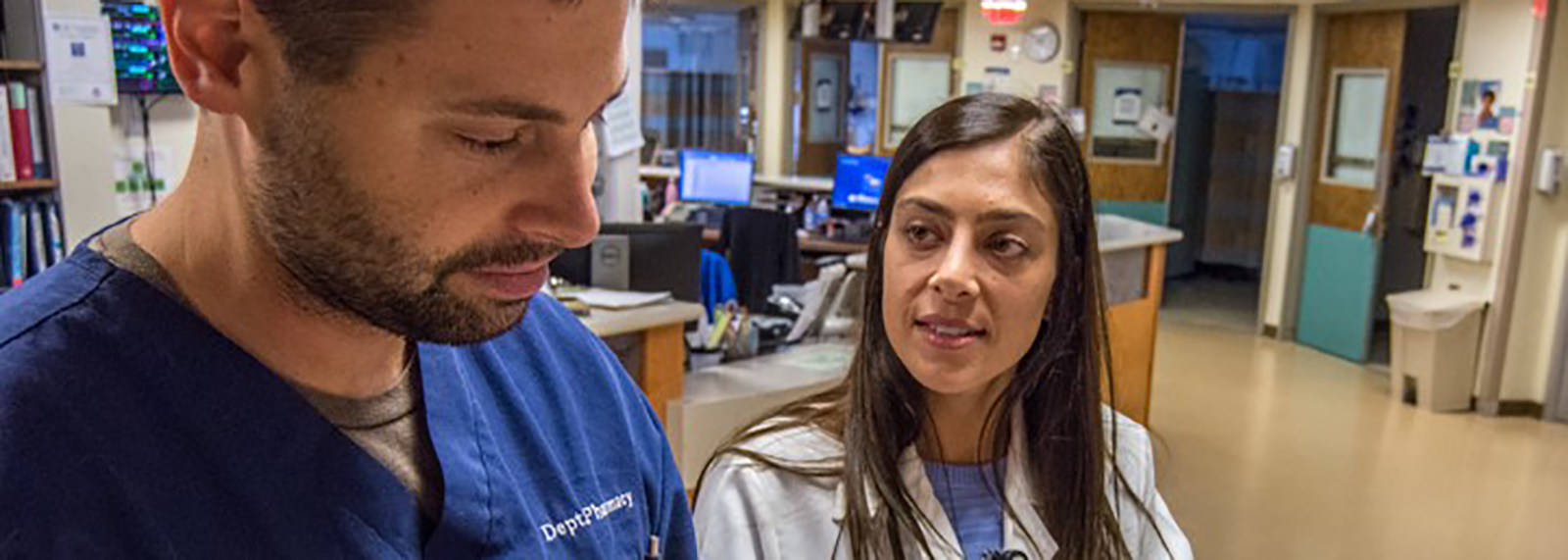PGY2 Critical Care
Welcome From the Program Director
Christine M. Groth, PharmD, FCCM, BCCCP
*Last updated 2020-2021
Our PGY-2 Critical Care residency program provides you with an opportunity to develop advanced knowledge and skills in a collegial critical care environment within a large academic medical center. We have a well-rounded program offering numerous patient care experiences in the ICU, ED, and Critical Illness Recovery Program Clinic. Additional highlights include a supportive interdisciplinary research program, multiple teaching and precepting experiences, and participation on quality assurance committees. A huge strength of our program are the highly qualified and dedicated preceptors who are fully integrated and leaders within their patient care teams. They are a devoted team of people who truly enjoy training and educating our residents and are committed to ensuring their success.
Our Program By the Numbers
6
6
10
105
At a Glance
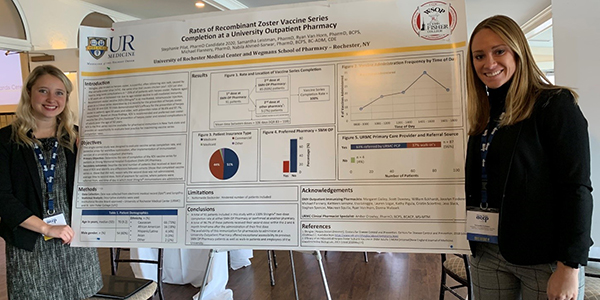
Program Curriculum
Our full-time curriculum provides the essential elements needed to mold a well-rounded clinical pharmacist.
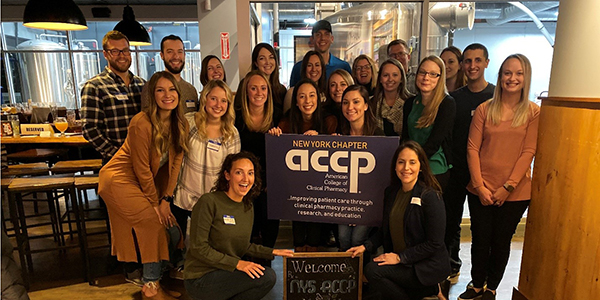
Resident Well-Being
Burnout is real. Our longitudinal programming on building resilience, finding work-life balance, and managing stress is one of the reasons residents recommend URMC.
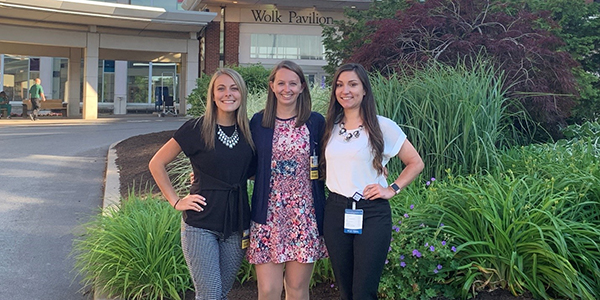
Life of a Resident
Our emphasis on work/life balance is an important reason fellows choose URMC. A focus on trainees' well-being enables you to learn and thrive in Rochester.
Program Details
The Critical Care Pharmacy Residency at UR Medicine Strong Memorial Hospital is a 12-month, full-time curriculum that provides the essential elements needed to develop a successful pharmacy specialist. This intensive training involves activities in a wide variety of intensive care and emergency medicine practice settings.
- Providing optimal medication therapy management for critically ill patients
- Designing and managing pharmacotherapy regimens for hospitalized patients in a variety of intensive care units and in the emergency department
- Participation in medical emergencies and resuscitation teams (cardiac arrest, sepsis alerts, PERT, Stroke, rapid response), and attend code debrief meetings
- Opportunities to advance practice and improve the medication use system through guideline development, medication event report review, and electronic medical records updates
- Participation in didactic management lectures and contribution to critical care pharmacy management through participation on quality assurance and process improvement committees both locally and nationally
- Participation in activities to develop the skills necessary to critically evaluate the literature pertaining to the care of critically ill patients (emergency medicine/critical care pharmacy conference and journal club, ICU fellow journal club)
- Numerous opportunities for precepting, teaching, and counseling patients or their family members, students, residents, pharmacists, and other health care professionals as an integral part of the health care team (pharmacy resident conference, Critical Illness Recovery Program Clinic, ICU nurse in-service, local/regional/national meetings)
Pharmacists completing this residency will be competent and confident practitioners of direct patient care in any intensive care environment. They will be accountable for achieving optimal drug therapy outcomes as members of the health care team. These pharmacists will exercise skill in educating other health care professionals, patients, and their family members on drug-related topics. Also, the pharmacist will be able to integrate the accumulated experience and knowledge gained during previous training and transform it into improved pharmaceutical care for patients who are critically ill. They will demonstrate professional maturity by following a personal philosophy of practice, monitoring their own performance, exhibiting commitment to the profession, and exercising leadership in improving the efficiency and safety of the medication-use system.
Rotation Schedules
The schedule for the residency year is outlined below and is tailored to meet the needs and interests of the individual resident.
Core Rotations (Required)
- Medical Intensive Care I and II
- Surgical Intensive Care I and II
- Neuromedicine Intensive Care
- Burn/Trauma Intensive Care
- Cardiac Intensive Care
- Emergency Medicine
Longitudinal Rotations (Required)
- Critical Illness Recovery Program Clinic
- Management
- Preceptorship
- Presentations
- Research
- Resuscitation
Advanced Clinical Practice (Longitudinal)
Following completion of the orientation period, the PGY2 Critical Care Pharmacy Resident will be required to provide comprehensive pharmacy services as part of the critical care pharmacy team every fourth weekend and on assigned UR Medicine holidays.
Elective Rotations
Elective rotations are designed to customize the critical care experience to the needs and desires of each resident. Electives include:
- Selection of 3-4 rotations (12 weeks total):
- Pediatric Intensive Care
- Neonatal Intensive Care
- Highland Hospital Intensive Care-Community
- Nutritional Support
- Toxicology
- Cardiovascular
Additional Opportunities and Research
The resident will receive training in Advanced Cardiac Life Support (ACLS) or Pediatric Advanced Life Support (PALS) and Advance Trauma Life Support (ATLS) and will participate in code simulations. This training will aid the resident in attending medical and surgical resuscitations throughout the year.
Residents will also have opportunities to develop teaching skills by providing presentations to both the pharmacy staff as well as faculty, residents, and students in other health care professions both locally and regionally.
Completion of a research project and a drug use evaluation related to critical care are required and the results are to be presented at a local or regional conference. A manuscript in a form suitable for publication will be required. The resident will receive funding to attend the SCCM Annual Congress, the NYS ACCP annual meeting, UB resident research day or Eastern States, and the Syracuse Toxicology Teaching Day.
Resident Well-Being
Life of a Resident
- 7:00 a.m. Grab a coffee from the coffee cart and start pre-rounding on patients.
- 8:30 a.m. Meet with preceptor to discuss patients.
- 9:00 a.m. Round with team.
- 12:00 p.m. Eat lunch with co-residents and follow up on patients.
- 2:00 p.m. Meet with preceptor for topic discussion/literature review.
- 2:00 - 3:00 p.m. ICU lecture with medical residents and fellows.
- 4:00 p.m. Touch base with team/attend evening rounds.
- 5:30 p.m. Head home and enjoy the night!
*Schedule will vary depending on the rotation the resident is on during the year.
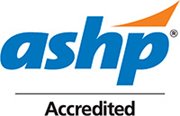
Purpose Statement
The PGY2 critical care pharmacy residency program will build on Doctor of Pharmacy (Pharm.D.) education and PGY1 pharmacy residency programs to contribute to the development of clinical pharmacists in the specialized areas of critical care medicine. The PGY2 critical care residency will provide residents with opportunities to function independently as practitioners by conceptualizing and integrating accumulated experience and knowledge and incorporating both into the provision of patient care in the critical care setting. Residents who successfully complete an accredited PGY2 pharmacy residency in critical care are prepared for advanced patient care, academic, or other specialized positions, along with board certification.
We place tremendous value on resident well-being and offer a longitudinal series which helps our residents achieve a better work-life balance. We strive to provide our residents with the skills they need to manage their stress and build resilience, not only for residency training, but for their professional careers.
Sessions incorporate guest speakers, various icebreaker activities, events such as preceptor-resident get-togethers, and lots of fun!
Topics covered include:
- Understanding Wellness, Resilience, and Burnout
- Developing Self-Care Strategies as a Resident
- Understand Factors That Can Contribute to Burnout
- Handling Conflict and Difficult Conversations
- Creating a Culture of Resident Well-Being
What Our Graduates Are Saying...
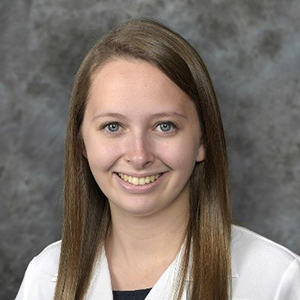
"I chose URMC for my PGY2 because after completing rotations here as a student and a PGY1 resident I was amazed by the dedication each preceptor had for teaching! We also have a plethora of critical care units and since we are the regional referral center I get to experience caring for the most complex patients."
Mikaela Brown, PharmD
PGY2 Critical Care
Class of 2020-2021
Contact Us
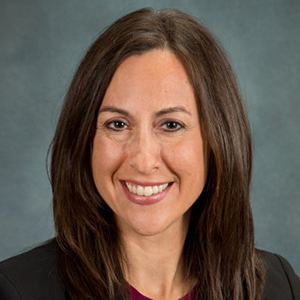 Christine M. Groth, PharmD, FCCM, BCCCP
Christine M. Groth, PharmD, FCCM, BCCCP
Director | PGY2 Critical Care Residency Program
Clinical Pharmacy Coordinator-Adult Critical Care and Emergency Medicine
University of Rochester Medical Center
601 Elmwood Avenue, Box 638
Rochester, NY 14642
Office: (585) 275-4368
The information contained herein is subject to change. Please feel free to contact the residency program directly for the most up-to-date information and/or other residency related questions.
